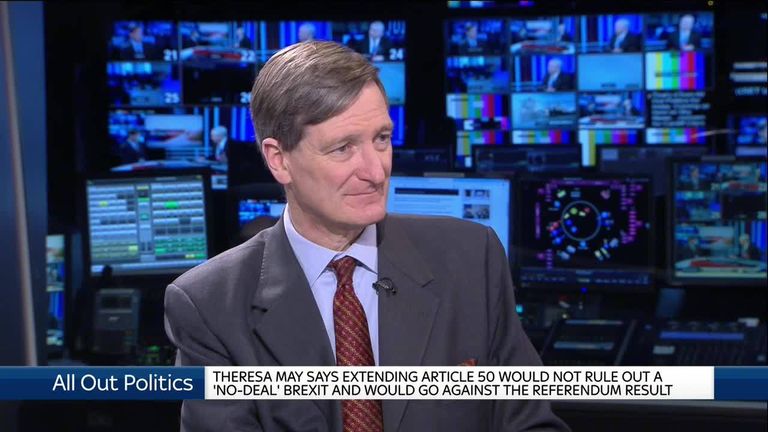EU would want 'clarity' before delaying Brexit, minister warns MPs
The Brexit secretary warns MPs and says the government "remains committed" to "delivering a deal that respects the referendum".
Tuesday 22 January 2019 15:29, UK
MPs seeking to delay Brexit have been warned by a government minister that the European Union may not necessarily agree to it.
Brexit Secretary Stephen Barclay told Sky News the option of extending Article 50 - the legal mechanism triggered by Theresa May in March 2017 to begin the negotiations - is not a "unilateral decision" for Britain to take.
The prospect has been raised by opponents of a "no-deal" Brexit as a way of avoiding this scenario, which they fear will cause widespread disruption as Britain quickly moves from one set of rules and regulations to another.
A number of MPs have tabled amendments in the Commons in an attempt to block a no-deal departure.
Once Article 50 is activated, a country has two years to negotiate the terms of its exit and get the agreement signed off by its parliament.
If no agreement is in place at the end of this period they revert to trading with the EU under World Trade Organisation rules.
But in comments that will likely be seen as an attempt to corral MPs into backing the PM's deal and ensuring Britain leaves with an agreement, Mr Barclay said there was an assumption "that everyone in Brussels would want to extend".
"What's clear from the conversations we've had with figures in Brussels is that they wouldn't want to extend if there wasn't a deal, if there wasn't clarity as to why we were extending," he said.
:: Backstop? Customs union? Brexit jargon explained
He stressed the government "remains committed" to "delivering a deal that respects the referendum result" and the "best way" of avoiding the risk of no-deal is to "have a negotiated deal".
Extending Article 50 would simply "defer the uncertainty", Mr Barclay said.
As the clock ticks ever closer to exit day, Mrs May is coming under increasing pressure to rule out leaving without a deal.
But the PM has said the only ways to avoid this are for a deal to be approved or for Article 50 to be revoked.
The latter option has been rejected by the prime minister because she says it would reverse Brexit.
Work and Pensions Secretary Amber Rudd has reportedly warned the PM that dozens of ministers could quit if they are prevented from voting to stop no-deal.
It has been claimed that 25 to 40 members of the government want to vote for an amendment drafted by Labour's Yvette Cooper and Tory backbenchers Sir Oliver Letwin and Nick Boles.
Ms Rudd is said to be telling Number 10 that it should offer a free vote on the issue.
The Cooper-Boles amendment wants to give MPs a vote to prevent a no-deal scenario.
It would give Mrs May until 26 February to get a deal approved. If not, then MPs would be given a vote on whether to extend Article 50 by nine months.
Tory MP Dominic Grieve, a former attorney general, has put forward an amendment which would see MPs take control of Commons business.
He has said this would allow them to stage a series of "indicative votes" on Brexit alternatives, such as a "soft" Norway-style deal or a second referendum, to show what would command the support of a majority of MPs.
Speaking to Sky News, Mr Grieve accused the government of trying to "close down debate".
Labour has tabled its own amendment, which calls for a vote on its plan for a customs union with the EU and whether to legislate to "hold a public vote on a deal or a proposition" that is supported by a majority of MPs.
The motion has been seen by campaigners for a second referendum as a shift towards Jeremy Corbyn backing the idea.
But shadow business secretary Rebecca Long-Bailey has told Sky News the party's "priority" remains its own Brexit deal. She said the amendment aims to "widen debate" and put "all options" on the table to avoid no-deal.
Ms Long-Bailey acknowledged there was "no guarantee" a majority of MPs would vote in favour of a second referendum, describing the issue as "so divisive".
MPs forced Mrs May to return to the Commons on Monday to outline her next steps on Brexit in the wake of her deal being defeated last week.
They will now be able to table amendments in a bid to influence the Brexit process, with votes due to take place on the amendments selected by Commons Speaker John Bercow next Tuesday.







